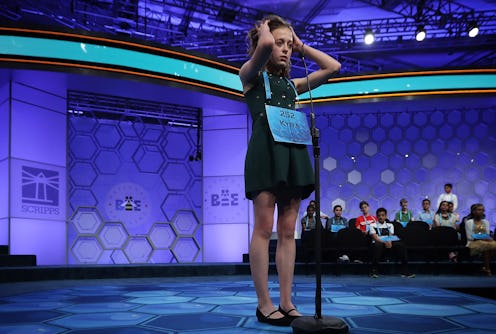News
The Way National Spelling Bee Words Are Chosen Is Very, Very Mysterious

The annual Scripps National Spelling Bee is more mysterious than you might think. While the event has grown in renown and fandom over its 90-year history, there's still little known about how National Spelling Bee words are chosen — perhaps as little as you know about what the words themselves even mean.
Every year, hundreds of students, along with their beaming families, descend on Washington, D.C., for the Bee. The event is now broadcast on ESPN so viewers nationwide can get a little taste of just how little they know of the sprawling and quirky English language — and its spelling hurdles.
But getting current information on how those words are chosen is no easy task. According to a 2009 article from Slate, there is a committee that compiles the list of words. But apparently, the process for putting that list together isn't even as mysterious as getting information on just who is a part of the committee. According to Slate, the committee is composed of 12 people, and those members get started on collecting words as soon as the national competition wraps up in D.C.
In a 2005 interview with NPR, Jacques Bailey — the official pronouncer for that year's National Spelling Bee — verified they begin searching for words immediately upon the close of spring's annual spelling final. Each potential word is given a rating by the committee on a scale of 1-5. While Bailey did not specify how that rating system broke down, he did indicate there are disagreements amongst committee members at times.
According to FiveThirtyEight, all words asked at the competition will appear in Webster's Third New International Dictionary. An analysis run on the spelling words used from 1994 - 2014 indicated that the "language of origin" spellers best brush up on is Latin. Words with a Latin background appeared most often in competition. In fact, words that originated in Latin, Middle English, or French accounted for a full 54 percent of all spelling bee words during that 20-year period.
FiveThirtyEight looked at 29 languages of origin that had words appear at least 20 times past the first round of national competition. Among those 29 languages, Hebrew stood out as the "hardest" for students to accurately spell. The bee competitors only got Hebrew words right 45 percent of the time. Next most difficult were words that originated in Persian, with an average accuracy rate of 58 percent.
In his interview with NPR, Bailey indicated that sets of words were chosen based on their language of origin, while other words were plucked sometimes at random by committee members.
Oliver Roeder — also for FiveThirtyEight — conducted his own set of research on predictions regarding whether a word would be spelled correctly. Interestingly, word length seems not much of a stumbling block for the serious speller. He found the median length of spelling words to be nine letters, with the average length of incorrectly spelled words falling at 8.95 letters. More letters doesn't necessarily mean more trouble for excellent spellers, which likely factors into how the Scripps' committee decides on inclusion or exclusion of new words.
Roeder also found that one sound tends to trip spellers up more than any other — what he deems "the deadly ə," otherwise known as the schwa sound. It can be made by any vowel and sounds kind of like "uh." Many spellers have stumbled over that one during final rounds, which is why knowing the language of origin can be so particularly helpful in figuring out what vowel (or even "y") to use in spelling the ə properly.
With nearly half a million words in Webster's to choose from, spellers cannot possibly prepare for all of them. So here's hoping the committee's secretive ranking system works, and no one gets stuck with too obscure an entry.